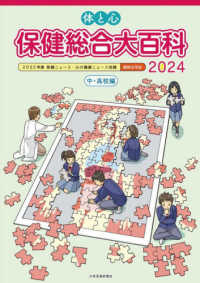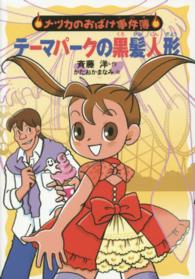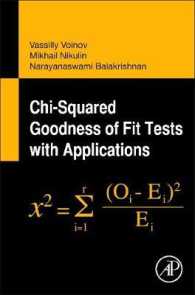- ホーム
- > 洋書
- > 英文書
- > Science / Mathematics
Full Description
The only text to focus on study and communication skills specifically for bioscience students, helping them get the most out of their degree, and develop the skills and experience that will make them more employable after graduation.
Written in an encouraging manner using biological examples, this book assists students as they transition to university studies and progress to employment. Readers are guided towards a greater understanding of what they need to do to make the most of resources available, how to approach assessment in a way that recognizes what they need to achieve, and how to reflect on their progress to maximize employability.
Key features:
Written by two award winning bioscience teachers and a career development specialist with a background in bioscience to offer expert guidance throughout.
A particular emphasis on foundational skills that really make a difference to students: 'managing your time well', 'thinking critically', and 'developing yourself'.
Biological examples throughout demonstrate the relevance of the skills being discussed to students' programme of study.
The authors explain how to communicate ideas effectively across all required assessment formats, and how to prepare for and complete exams whilst maintaining wellbeing to help students succeed in their assessments.
The flexible structure enables students to read the chapters in any order, tailoring their reading to the skills most relevant to them.
New to this edition:
'What I Wish I Knew Earlier' videos capture bioscience students reflecting on their university experience and sharing their key takeaways to help other students thrive.
A fresh structure to the content, with new chapters including Chapter 5 'Getting yourself organized' and Chapter 12 'Key competencies: collaboration and critical thinking', which provide broader coverage and greater support than ever before.
A discussion around the use of Generative AI in university provides students with insights into the benefits and drawbacks of this new technology with a focus on academic integrity and best practices.
A greater focus on student wellbeing encourages students to balance their responsibilities in and outside of university.
Digital formats and online resources:
The 4th edition is available for students and institutions to purchase in a variety of formats: the e-book and Science Trove offer a mobile experience and convenient access along with student-created videos, additional poster examples, functionality tools, navigation features and links that offer extra learning support.
For more information about e-books, please visit www.oxfordtextbooks.co.uk/ebooks
Contents
Introduction
Stage 1: Getting the most out of your course
1: The transition to higher education
2: Know your course
3: Making the most out of taught sessions
4: What to do outside of taught sessions
Stage 2: Navigating assessment at university
5: Getting yourself organised
6: Exams
7: Preparing for coursework assignments
8: Creating written coursework
9: Researching your coursework topic
10: Developing visual and oral presentation skills
11: Revising drafts and finishing touches
12: Key competencies: collaboration and critical thinking
Stage 3: Preparing for your future
13: Making the most of feedback
14: Making yourself employable







